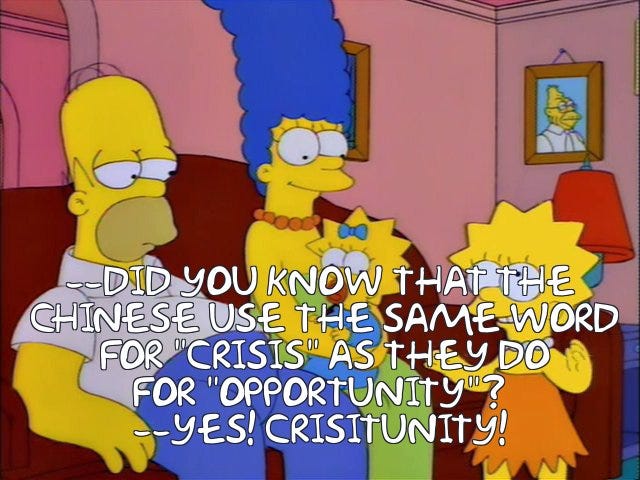“It’s a bit of a crisis-tunity,” noted Dafna Kaplan, chief executive of Cassette Systems, a modular homebuilding company she founded in 2020. — Los Angeles Times, “ADUs made of shipping containers and robot-built bungalows are a growing trend as L.A. rebuilds post-fire,” May 9, 2025. (Archive link)
The context is new, but crisis-tunity isn’t. It was invented in more streamlined form — crisitunity — more than 30 years ago, by the writers of The Simpsons. Here’s the Simpsons Wiki synopsis of the “Fear of Flying” episode, which originally aired during Season 6, on December 18, 1994:
Homer gets banned from Moe’s Tavern after playing a lame prank, and uses an airport bar as his new watering hole, but when Homer is mistaken for a pilot and causes an accident, the head of the airline pays him off with a vacation to anywhere in the United States (except for the freak states, Alaska and Hawaii).
The Moe’s ban prompts daughter Lisa to offer encouragement:

Which prompts me to offer a few thoughts of my own.
Crisitunity is just one of the ways in which The Simpsons has embiggened our vocabulary. There is, of course, embiggen itself (“Lisa the Iconoclast,” February 18, 1996). The show’s writers have been especially fond of portmanteaus: In addition to crisitunity, there’s craptacular, frogurt, spankological, and tomacco. Here’s a list of 10 Simpsons neologisms; although diddly made the list, it actually pre-dates the show by at least three decades. (See Ben Zimmer’s post for the Strong Language blog about diddly and doodly-squat.) We also have The Simpsons to thank for d’oh! and meh.
I used to write about the Simpsons a lot! I was obsessed with the fake brand names on the show and wrote three long posts celebrating them: Here’s the original Simpsons Brand-o-Rama, from 2007; here’s 2008, and here’s 2009. Lard Lad! Clam-alot! Finger-Looking Good Nail Salon! Broken Dreams Storage Lockers! Oogle! And much, much, much more.
I was inspired to write the Brand-o-Ramas by linguist Heidi Harley’s Simpsons linguistics joke collections, which I’m happy to see are still alive on the internet.
Crisitunity is sometimes rendered as crisatunity, although the crisitunity spelling is more popular. It’s been adopted by investment advisors, motivational coaches, and the libertarian Cato Institute, and others. The crisis-tunity spelling has shown up in a Columbia University School of Professional Services essay, a facilities-management blog, and a Workers World article. It has even come full circle to the (English-language) Beijing Review, in a 2009 article headlined “Crisis Focus: Crisis vs. Crisistunity.”
About that Chinese crisis/opportunity reference: It’s usually phrased as “The Chinese word [or character] for ‘crisis’ means ‘danger and opportunity’,” and we have John F. Kennedy to thank, or blame, for that. In 1959, while still a U.S. senator, JFK spoke to the United Negro College Fund about education and leadership, saying, “When written in Chinese, the word ‘crisis’ is composed of two characters — one represents danger and one represents opportunity.” Other prominent figures, including John Foster Dulles and Al Gore — “a multiple offender,” to quote Ben Zimmer on Language Log — perpetuated the trope. It’s inaccurate, as Zimmer and other Language Log contributors have repeatedly reminded us. Here’s the clearest debunking I’ve found, from a 2000 Straight Dope post:
In Chinese, the word for danger is wei xian and opportunity is ji huay. These are obviously two different words, native Chinese speakers note, so it’s not literally true that crisis in Chinese is a combination of danger and opportunity. The fact that wei ji (crisis) contains elements of both terms is happenstance, they say, just as in English multiply and multifunctional aren’t synonymous even though they share a prefix. . . . The simplest explanation is that wei ji literally means precarious moment — a pretty close approximation of crisis, and not necessarily one meant to suggest a paradox.
That seems perfectly cromulent to me!




You mean someone made an incorrect cultural observation and it became accepted truth?
That's unpossible!
Can't help but feel like this meme took off in part because it's so similar to the Chinese "may you live in interesting times" proverb (which also may or may not be completely made up, I have no idea!)...